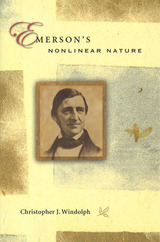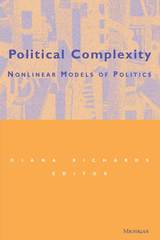
In this provocative study, Christopher Windolph analyzes Emersonian naturalism from the standpoint of nonlinearity, offering new ways of reading and thinking about Emerson’s stance toward naturalism and the influence of science on his thought. Drawing on ideas in perspective theory, architecture, and nonlinear dynamics to argue that Emerson’s natural philosophy follows from his analysis of the development of organic forms, Windolph breaks new ground in Emerson studies by exploring how considerations of shape and the act of seeing underpin all of Emerson’s theories about nature.
Bringing to his study a focused attention to the history of Western science and philosophy, Windolph reexamines Emerson’s understanding of how the act of seeing occurs and of the eye’s ability to see through appearances to organizing principles, showing how Emerson’s naturalism extends beyond the narrow confines of traditional linear science. Through extensive readings of Emerson’s journals, essays, and lectures, Windolph shows that Emerson was an empirical idealist who integrated a scientific approach to nature with an exploration of nonlinear principles, revealing him to be more prescient in his writings about certain recent developments in scientific thought than has been realized.
This work makes a major contribution to the ongoing study of Emerson and science, expanding Emerson’s role as a major American philosopher while rebutting those who see him primarily as a rhetorician or poetic propagandist. Emerson’s Nonlinear Nature opens new ways of thinking about Emerson’s work in its nineteenth-century contexts, reassesses his reception in twentieth-century criticism, and makes a strong case for his continuing relevance in the century ahead.


The contributions to this collection are organized in terms of three branches within non-linear theory: spatial nonlinearity, temporal nonlinearity, and functional nonlinearity. The chapters advance beyond analogy towards developing rigorous nonlinear models capable of empirical verification.
Contributions to this volume cover the areas of landscape theory, computational modeling, time series analysis, cross-sectional analysis, dynamic game theory, duration models, neural networks, and hidden Markov models. They address such questions as: Is international cooperation necessary for effective economic sanctions? Is it possible to predict alliance configurations in the international system? Is a bureaucratic agency harder to remove as time goes on? Is it possible to predict which international crises will result in war and which will avoid conflict? Is decentralization in a federal system always beneficial?
The contributors are David Bearce, Scott Bennett, Chris Brooks, Daniel Carpenter, Melvin Hinich, Ken Kollman, Susanne Lohmann, Walter Mebane, John Miller, Robert E. Molyneaux, Scott Page, Philip Schrodt, and Langche Zeng.
This book will be of interest to a broad group of political scientists, ranging from those who employ nonlinear methods to those curious to see what it is about. Scholars in other social science disciplines will find the new methodologies insightful for their own substantive work.
Diana Richards is Associate Professor of Political Science, University of Minnesota.
READERS
Browse our collection.
PUBLISHERS
See BiblioVault's publisher services.
STUDENT SERVICES
Files for college accessibility offices.
UChicago Accessibility Resources
home | accessibility | search | about | contact us
BiblioVault ® 2001 - 2024
The University of Chicago Press









